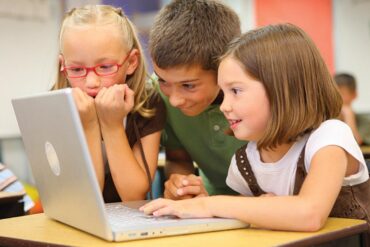The global Covid pandemic has drastically changed our lives and all of us are now conducting our everyday activities in completely unfamiliar modes. Physical distancing has become a key element in the new protocol. The biggest impact has been in those activities—public or private—which involve a gathering of people. One of the sectors that was tremendously affected is education, with schools and colleges remaining closed indefinitely. The authorities across the country have resorted to online education as a way out. Each State has adopted its own policy on this. While online education is generally regarded as the only solution available at the moment, it comes with its own specific challenges and pitfalls. Here are ten reasons why online education is not that desirable a solution as we are persuaded to believe.
It widens the social divide
Shifting education to the digital platform gives an obvious and undue advantage to the rich and privileged class of society. They have better gadgets, stronger connectivity and greater familiarity with the technology. If education is supposed to be a social leveller, the weaker sections in this case are pushed several yards behind even before the race has begun. Digital divide or technological inequality is a reality, especially between the urban and rural areas. The unfortunate death, by suicide, of a poor schoolgirl on the first day of the new academic year is a grim pointer to this unpleasant truth. While the various government bodies, at least in Kerala, are trying their best to ensure the availability of devices and network, the fact is that there will still be areas which are left out. And the biggest losers will be those who are already disadvantaged—the rural poor, the migrants, the tribals and those who live in remote pockets.
Home isn’t necessarily the same for everyone
By making online education universal and mandatory, the authorities seem to have assumed that all households are alike. They assume that the home is a happy place for all children and that it is easier for them to learn sitting at home. Perhaps it is true for most families. But there are also quite a number of unhappy homes which are simply not conducive for regular learning. There are many young people with no facility whatsoever at their homes and in some cases, the family includes abusive elders.
Exposing one’s background is not necessarily a welcome proposition for all. Young minds are quite sensitive to peer assessment. And many of them consider the time spent on the campus as a relief from the unpleasant realities of their personal lives. Online education does not factor these.
It lacks the socialising component
The teaching-learning exercise that takes place in the classroom is only one part of the totality of education. Much of the rest is provided by the social life on the campus. The personal interactions, collaborative engagements, shared experiences, conversations and meals all contribute towards the education of a student. What is the purpose of going to college? It’s not merely for accumulating knowledge, but for preparing the young person to live in a society. The campus is where the young boy or girl comes across and befriends individuals with various social and ideological backgrounds. It is where the young student experiences cultural difference. Online education, on the other hand, pushes him/her to islands of individuality and privacy. There is already the argument that this generation of youngsters has less of real social interaction. By denying them the experiences of a campus life as well, we are making it far worse for them.
Education is not mere data collection
A related argument is that this exercise reduces education to mere data collection. Online education assigns a higher value to quantifiable and downloadable content. Abstract notions, aesthetic values, sentiments and subjective responses of an experiential kind are sidelined. It does not encourage multiplicity of perspectives, subtleties, deliberations or arguments. This is dangerous and reduces education to a mere utilitarian and technical engagement. One is reminded of Charles Dickens’ famous novel Hard Times which opens with the words of Thomas Gradgrind, a School Superintendent: “Now, what I want is Facts. Teach these boys and girls nothing but Facts.” This is a wrong understanding of the purpose of education. It was Albert Einstein who gave what is perhaps the finest definition of education, when he said that it “is what remains in you after you have forgotten all that you have learnt in the classroom.” The present arrangement does not allow anything to remain with the students once their examinations are over. Online education gives no scope for any sentiments or memories to cherish. It’s a mechanical and repetitive exercise that kills the creative and emotional instincts of the young learner.
It seriously affects the nature of teaching and learning
Online education cannot replicate either the quantity or quality of classroom teaching/learning. There is no time for elaboration here. Data is precious, especially for the students, and has to be used diligently. The first casualty will be the interactive element. In most schools and colleges, the teacher lectures on Zoom, Google Meet, or some such platform and the students listen in passively after switching off their cameras and microphones. It is often a technical ritual, without much communication between the teacher and the learner. A text or topic that usually takes several sessions of discussion in a classroom will be dealt with in the online mode using the minimum time. And the whole orientation of teaching and learning is likely to be around the examinations and their grading mechanism.
It makes teachers irrelevant
As a consequence of the last two reasons, the teacher becomes irrelevant in the new scheme of things. A technological takeover is happening in education. We have several knowledge portals, online resources, Apps as well as courses and content offered by well-known institutions. In the information age, the teacher is no longer the only source of knowledge, and rightly so. But the experience and human interaction that a teacher offers is invaluable. But if online education becomes the mainstay, the very profession of teaching as we know it today can be endangered. Big universities and content providers will attract students from all over the world, offer the new kind of education and certify them. The local school and college will turn redundant and this will have serious sociopolitical and cultural implications.
It weakens critical thinking and political practice
One immediate fallout of online education is that it allows no space for critical thinking, let alone political praxis. The vibrant debates, protests and agitations that take place in campuses now and which actually enhance and deepen our democracy, will soon be a thing of the past. With no collectivity or gathering possible, the students will no longer be political subjects but passive consumers of educational content. The JNU of the future will be more like a self-financing private institution, with disciplined boys and girls in uniform. Remember, well-behaved and obedient youngsters may be good news for parents and authorities, but they are usually useless for the nation.
It allows power structures to monitor individuals
Such a scenario is very convenient for the powers that be. Dissent will die a natural death. The student community will be depoliticised. Any aberrations will be dealt with strictly. The State will have a greater role in the formation of the citizens. This is an opportunity that any fascist government will grab immediately.
It furthers the Neo-Capitalist agenda
Capitalism is always on the lookout for new opportunities for making money. It is driven only by self-interest and profit motive. Its ideological engagement with education can be recognized in two ways.
a) It looks at Education primarily in terms of employability. It is not interested in the overall development of knowledge and sensibility. Hence it prefers vocational training any day to philosophy, arts or the humanities. b) The second mode of the Capitalist engagement is in the very commodification of education. It treats education as a product that can be marketed and sold. It therefore sees tremendous business opportunity in the sector. While it wasn’t that easy to control the traditional mode of classroom teaching, this recent shift to online education can easily pave the way for what can be described as the LPG (liberalisation, privatisation and globalization) of education.
The contingency plan can become the norm
If the reader thinks that too much of a case is made against what is actually a temporary or contingency plan, well, that’s where the real danger lies.This contingency plan has every chance of becoming the norm. It suits the interests of both the State and Capitalism. And whenever the interest of the government aligns with that of the Corporate world, what we usually get is a deadly combination that is both irresistible and inevitable. Online education is fine as long as it remains a supplementary tool for the classroom engagement on a vibrant campus. In unavoidable circumstances, it can even be a substitute. But we should never allow the substitute to become the substance itself. Online education should never be allowed to replace the real learning process that involves the communion of teachers and fellow students. That social space is precious and needs to be protected at any cost.







